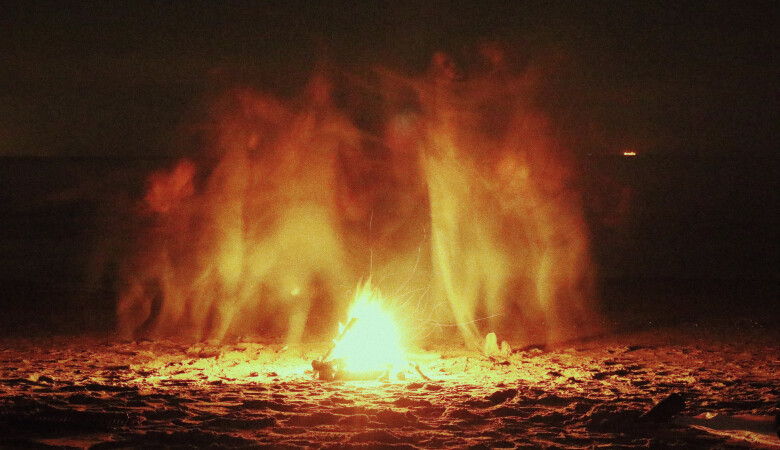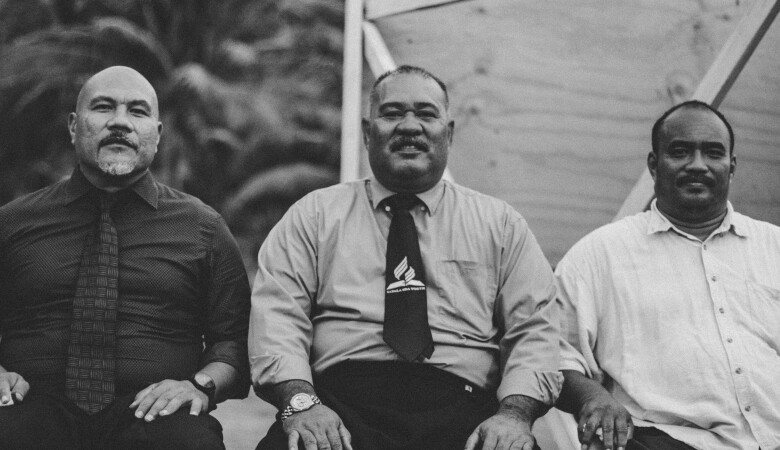Christ Regains Man's Glorious Throne (Hebrews Sermon 6 of 74)
October 10, 2010 | Andy Davis
Hebrews 2:5-9
Incarnation
Appearances Can Be Deceiving
This probably is my favorite time of year. I love the low humidity and the piercingly blue skies I saw yesterday. I was standing out in the yard with my daughter and we were just looking around at the sky and how fiercely blue it is. Don't you love this time of year? Maybe I'm alone in that, I don't know, but I just love to see the changing seasons, the leaves turning. I'm not excited about the fact they're about to descend under my lawn for the 12th consecutive year, and I'll have to clean them up, but I do love this time of year.
And as we were standing out there, , I was just thinking about the gift of vision and what a beautiful thing this world is that He's made. And how the light just streams into our eyes and gives us the picture of the world around us. And it occurs to me as I stand before you and preach today, I desire to be somewhat of an eye doctor, a spiritual eye physician, to help you to see what ordinarily we would not see. Because there is physical vision and then there is spiritual vision, and we need to see what we do not see. We need to see spiritually what we cannot see physically. And this text, Hebrews 2:5-9, talks about what we do not see and what we see, and the difference between what ought to be or what will be someday and what is now. And so "At present," the text says, "We do not see everything subjected to Him." The "Him" is first and foremost Jesus. What is subjected is humanity under Him. We'll talk about that, but we don't see everything the way it should be. We do not see everything subjected.
Things are in disarray, things are in chaos it seems. There is pain and misery and suffering, we'll talk about that. But then the next verse says, "But we see Jesus." And so therefore, it just occurs to me that my job, my responsibility is to enable you to see Jesus today. That's what I'm here for, to be somewhat of an eye physician. Sometimes it just happens by prayer. Remember how Elisha with his servant, they're in Dothan and surrounded by the Aramean army, and he's like, "Don't worry about it. There's more on our side than on theirs. We're fine." "I don't get it," says the servant. "I don't see anything but trouble today." "Oh, Lord, open his eyes. Open his eyes." And his eyes were open and he saw chariots of fire. The hosts, the heavenly hosts surrounding them and everything was fine.
And so today, it's about spiritual vision. It's about being for me a spiritual eye doctor. We have some skilled physicians in this church, one in particular, a good friend of mine, an excellent eye doctor, and he's able with incredible technology to just shape the way that some people see, what had been blurry is suddenly brought into sharp focus. What a gift that is. May that happen today by the word of God. May we see Jesus today by the word of God. And if that's my privilege today, if that's my responsibility, what a gift that is to me. That I actually get to be up here and to proclaim Jesus to you, so that as a result of this time together, you see Jesus more clearly than you did before. What a gift that is.
The Context of Hebrews 2:5-9
Now what is the context of Hebrews 2:5-9? Well, remember I believe that the author is writing to some Jews who had made a profession of faith in Christ, but who are now under pressure. The world was squeezing on them, specifically I think the Jewish world. Squeezing on these Jewish people to renounce their confession of Christ. Give it up and come back to what they had grown up with, what they had always known, Judaism. Come back to Christless Judaism. Old covenant Judaism as they understood it, without Jesus of Nazareth, come back to that. The only way you can do that though is to renounce Jesus because he's come now, he's been clearly proclaimed. They've heard the gospel, they said they believed it, they probably had been baptized, we'll talk about all that, but they've made a profession of faith and now they are being tempted, they are under pressure, I think, from Jewish friends and family and neighbors, rabbis, authority figures to renounce Christ and go back to the old ways.
And so they are suffering in the world, they are getting beaten on, and they do not see everything arranged under Jesus. And so the author wants to give them Jesus, the spiritual vision of Jesus. That which we cannot do physically. It says in 1 Peter, "Though you have not seen him, you love him. And even though you do not see him now, you believe in him." So it's all about faith today and things that do not appear as they should be or as they will be. Of a world to come, it mentions in verse 5, about this world to come, a world that isn't here yet and that we can only see by faith. That's what we're about today. And so this author is talking about what is but ought not to be, what will be but isn't yet, and how appearances can be deceiving, how what you see may not be really what's going on. And how through it all we need to see the promises of God of a future world that's going to be submitted to Christ, everything under Christ, and of Christ at the right hand of Almighty God in glory, reigning in glory. You need to see that today.
And even though we are not first century Jews under persecution from rabbis and Jewish neighbors to go back to old covenant Judaism, we need to see Jesus today too, don't we? And so Hebrews 2:5-9 speaks to us. And what the author's going to do is he's going to be bringing in Psalm 8. Magnificent psalm, and he's going to be meditating a little bit on a portion of Psalm 8, and he just does this understanding the whole world view of Psalm 8. And so we have to do a little work on Psalm 8 because what he's doing is he's going back through the vision, the portal of Psalm 8 to look at how man was established in this world and how Jesus came in effect to reclaim our position of glory and status in this world through his redemptive work.
I. Man’s Original Place: A Throne of Glory
And so, man's original place through the vision of Psalm 8 is a throne of glory. It's a testimony really to man's surprising glory. As we look at Psalm 8, you don't have to turn there but you know the psalm and I'll just be quoting parts of it. The central issue of Psalm 8 is the central issue of the universe and the central issue of the Bible, God's glory. And so Psalm 8:1 begins, "O LORD, our Lord, how majestic is your name in all the earth." The great glory of God spread out over all the worlds. How majestic is your name. And then the Psalm ends that way, Psalm 8 in verse nine, "O LORD, our Lord, how majestic is your name in all the earth."
But a secondary issue in Psalm 8 is man's apparent smallness in light of the immensity of God's glory. "When I consider your heavens, the work of your fingers, the moon and the stars, which you have set in place, what is man that you are mindful of us? The son of man that you care for him?" What are we that you should even notice us? How immense is the cosmos? How infinite it seems and how great the number of stars. How vast they are. And what are we? What is man that you are even mindful of him? And yet, despite all the appearance of man's immense smallness, the Psalm says, "You made him a little lower than the angels; you crowned him with glory and honor and put everything under his feet," it says. Well, that's a bit surprising. It's not what you would think.
When we think about angels, angels are clearly more powerful than we are. Clearly. Angels dwell in heaven but we are dwelling here on earth. Angels see the face of God and we do not. Angels shine with the glory, a heavenly glory of God. We do not. Angels display supernatural power and we do not. So what is man in the light of angelic power and glory? And yet God, in creation, gave us a throne.
So the author to Hebrews here in Hebrews 2 introduces Psalm 8 and quotes it in a rather curious way. Verse 6 says, "There is a place where someone has testified: 'What is man that you are mindful of him, the a son of man that you care for him?'" Now, before you want to get after the author to Hebrews as though he doesn't know the Bible very well. Look, let me tell you something, the author to Hebrews knows Old Testament scripture better than you will in 10 lifetimes. He knows exactly who wrote Psalm 8. He's not confused about that nor has he forgotten it. He's always doing something, this author, this brilliant, genius author of the Book of Hebrews. He's always at something and you know what he's doing right now? Minimizing man and maximizing God. Does it really matter to my argument who wrote Psalm 8? Now, it will matter in Hebrews 4 that David wrote Psalm 95 so he's going to quote David as the author of Psalm 95. He'll talk about David. So he knows all about David and his authorship of the Psalms but here he just says, "There's a place where someone has testified: 'What is man that you are mindful of him?'" So he's pushing David to the background and saying, "Just someone wrote this." And Psalm 8 makes the point the author to Hebrews wants to make here in Hebrews 2, and that is, that God entrusted to man a place of glory and honor and creation. You made him a little lower than the angels. You crowned them with glory and honor and put everything under his feet.
By the word of God, man was made a little lower than the angels. He made him ruler, it says in Psalm 8:6-8, "You made them ruler over the works of your hands. You put everything under his feet, all flocks and herds, beasts of the field, birds of the air, and the fish of the sea. All that swim in the path of the seas." Man was put over all that. Made a little lower than the angels. Crowned with glory and honor.
Specifically, I think being created in the image of God and then given this position of rulership over the planet earth. And he did not give this position of honor and glory to angels even though they are stronger and more powerful. Look at verse 5, "It is not to angels that he has subjected the world to come about which we are speaking." The key issue then here is the world to come, and I'm going to talk more about the world to come, what it is, and Christ's rule over it, though man was originally given a place of glory and honor in this world.
The Glory of Man: Rulership over the Earth
So what is the glory of man? Of the human race? Rulership over the world. Genesis 1, this is our charter of rulership over the earth. Verses 26-28, "Then God said, 'Let us make man in our image, in our likeness and let them rule over the fish of the sea and the birds of the air, over the livestock, over all the earth, and over all the creatures that move along the ground.' And so God created man in his own image. In the image of God, he created him; male and female he created them. God blessed them and said to them, 'Be fruitful and increase in number, fill the earth and subdue it, rule over the fish of the sea, and the birds of the air, and over every living creature that moves on the ground.'" That's our charter as a human race, male and female in the image of God, rulership over all of these species. And so, I think we could look at it that Adam and Eve were in some way, originally invested with royal authority like a king and a queen, they were walking through their domain. Definitely under God, but they were like a king and a queen on the earth.
And they were to begin in Eden, and then they were to move out from Eden through the four rivers that flowed out of the head water that came from Eden: The Pishon, the Gihon, the Tigris, the Euphrates, carrying them to rest of the world so that they could see the glory of the God on the earth. And they would discover various species of plants and animals, of birds, and fish, and insects, and reptiles, and geology, all of the gold and onyx, and all of the things that there was to see in the earth, they would discover them. And they would fill the world and they would subdue it, and they would rule over it for the glory of God. And that honor, that glory and honor was given to man and not to angels.
II. Man’s Present Disgrace: Stripped of Glory
But what is man's present situation? What is our present disgrace? Well, we've been stripped of that glory. We've been stripped of it. We lost our position of glory. Adam fell into sin, joining Satan in his rebellion against God. We joined Satan's rebellion against God. And I think we handed over the keys of the planet to him when we did it. God had commanded Adam not to eat from the tree of the knowledge of good and evil, but Adam disobeyed God and was driven from the Garden of Eden. The ground under Adam's feet was cursed because of Adam's sin. And man and nature began a somewhat adversarial relationship. God said to Adam, "Cursed is the ground because of you; through painful toil you will eat of it all the days of your life. It will produce thorns and thistles for you, and you'll eat the plants of the field. And by the sweat of your brow, you will eat your food until you return to the ground, since from it you were taken; for dust you are and to dust you will return."
I get the image of Adam wrestling every day with the earth, and in the end, the earth wins, because Adam was going to die. And so, we have been in a great measure stripped of the glory and honor of our position in the world.
Furthermore, God actually assigned to an angel the responsibility to keep man out of Eden lest they eat from the tree of life and live forever. And so, there was an angel with a sword, flaming sword flashing back and forth. The Apostle Paul speaks of the cursing of nature and the groaning of the earth. In Romans 8:20-22, it says, "For the creation was subjected to futility, not by its own choice, but by the will of the one who subjected it, in hope... " Oh, those are sweet words. That's the world to come that the author is talking about here, but, "in hope that the creation itself will be liberated from its bondage to decay and brought into the glorious freedom of the children of God. "We know," says Paul, "that the whole creation has been groaning as in the pains of childbirth right up to this present time."
That is what we're talking about. We do not see everything subjected to Christ. We see a world seemingly at war with itself and with us. The author focuses on the word "everything." Look at verses 7-8, "You made him a little lower than the angels; You crowned him with glory and honor and put everything under his feet. In putting everything under him, God left nothing that is not subject to him." He's really emphasizing the everything aspect, everything under Jesus. "Yet at present, we do not see everything under him." We don't see it. Humanity has been stripped of its position of glory in the world.
At Present, We See Suffering and Death
And so, at present, we see tremendous suffering in the world. Let's just talk about natural disasters for a moment. Do you realize how many significant natural disasters there have been in the last 10 years? I didn't really realize until I did some research. One earthquake after another. And you can forget them, they just happen one after the other, and you can forget them. Do you remember that on January 26, 2001, there was an earthquake in Gujarat, India, killing 12,000 people. If you live in that vicinity then, and survived it, you'd remember that earthquake. Or the next month, another earthquake hit El Salvador. There was an earthquake in Algeria in 2003, killing 2200 people.
A huge earthquake in Iran in 2003, also day after Christmas, killing over 40,000 people. I think many of us certainly remember exactly a year later, December 26, 2004, with the Indian Ocean tsunami, that 9.3 on the Richter scale earthquake in the middle of the Indian Ocean that caused a terrible tsunami, that took out, it seems as close to a quarter of a million people, in 2004. 2005 Kashmir earthquake killed 80,000 people. 2008, there was an earthquake in China, Southwest China, Wenchuan earthquake, killing 69,000 people. I think we in America, we certainly remember all the hurricanes that struck the gulf coast region one after another. Certainly, Hurricane Katrina, we all remember that one but then came Rita and after that, Hurricane Ike. All of it hitting, more or less, the same part of our country. And the beginning of this year on January 12, an earthquake in Haiti killed almost a quarter of a million people and the country's still reeling from it. Still reeling. 2010 also in July, in Pakistan, there were terrible floods, heavy monsoon rains in various regions of Pakistan, displacing as many as 21 million people. Displacing 21 million people from their homes. They generally feel that the world has under-responded because it doesn't seem to be on the radar screen.
This is the world that we live in. Droughts, famines, earthquakes, plagues, endemics, it's a world seemingly at war with itself. We do not at present see everything under him, it says. At present, instead, we see suffering and death. And Hebrew Christians who were going through persecution, well, they understood God's original purpose in creation as well as the author to Hebrews did. They knew the Genesis story as well as he did. In the gospel, the power of Christ is clearly proclaimed to bring everything together under one head, with Christ ruling over everything and everything at peace and orderly under his feet.
We've already seen it in Hebrews 1:13, "To which of the angels did God ever say, Sit at my right hand until I make your enemies a footstool for your feet." I'm going to put everything under you. Christ as God overall, He's able to crush all of His enemies under His feet, but at present, we do not see this power openly and obviously. Not only is nature making life miserable for all humanity, unbelievers are specifically making life miserable for Christians. So it doesn't seem like Jesus' enemies are being handled very well. They seem to have the upper hand in one country after another. And so, the author later in this book, in Hebrews 10 says, "Remember those earlier days after you had receive the light, when you stood your ground in a great contest in the face of suffering. Sometimes you were publicly exposed to insult and persecution. At other times, you stood side by side with those who were so treated. You sympathized with those in prison and you joyfully accepted the confiscation of your property because you knew that you yourselves had better and lasting possessions." That's a hard time, friends. That's a very, very hard time. And so the author to Hebrews is ministering to these hurting people who are suffering in a world that seems to want to chew them up and spit them out.
How can you say everything's going to be under Jesus' feet? Doesn't seem that way. And He's trying to give them a vision by faith, of what will be. In speaking of the world to come, that's what he's talking about. Things are not as they should be and the only solution for us now, first and foremost, friends, this morning, right now, is to see Jesus. Amen?
Look at verse 9, "But we see Jesus." And that you would have a spiritual vision of Jesus that is so compelling and so powerful, based on scripture that you can face the earthquakes and famines and dangers and persecutions and say, "It's true that at present we do not see everything's subject to Him, but someday we will." Amen? Some day, it's coming, and by faith, we're looking forward to that day. That's what the author is doing here, he's saying, "Let's look at Jesus." And if you look at Jesus, things in His life weren't always as they should have been, it seems. Things were not as they appeared to be either. Jesus was not who He appeared to be to His enemies. And we have to start that story by understanding Jesus' original glory.
III. Jesus’ Humiliation: Incarnation, Suffering, and Death
Just how glorious was Jesus before He came to earth? How magnificent, how great, was the glory of the second person of the trinity, before He took on human flesh? Well there are lots of testimonies to it, but none better than Isaiah 6. "In the year that King Uzziah died," Isaiah wrote, "I saw the Lord, seated on his throne, high and exalted. And the train of His robe filled the temple. And above Him were seraphs." Those are angels, bright, burning angels. "Each with six wings: with two wings, they covered their faces." I've often meditated on that. Because of the greater glory of Jesus. "With two wings they covered their feet, and with two, they were flying. And they were calling to one another, 'Holy, holy, holy is the Lord Almighty. The whole earth is full of His glory.' And at the sound of their voices the doorposts and thresholds shook and the temple was filled with smoke." That's the greatness of Jesus. And if you wonder whether it's Jesus or not, as a Christian, you don't need to wonder, but Apostle John told us it was. In John 12:41 it says, "Isaiah saw Jesus' glory and spoke about Him."
So we know that's Jesus. That's the greatness of his glory. But He laid all of that aside and took on a human body. He took on humiliation, really. We see Jesus' humility in incarnation. So the night that Jesus was born, all the angels gathered to celebrate it and worship Him. Apparently, Jesus had become a little lower than the angels. Seems like a lot lower than the angels. So if you're one of the shepherds that night, here are two experiences. You have an experience with angels and you have an experience with Jesus. The angels come with heavenly glory. Bright, shining glory in the middle of the night and you're terrified. Never seen anything like it. One angel lights up the whole place. And then an army of angels come and they give glory and praise to God. Glory to God in the highest. And peace to those on whom his favor rest. And this awesome glory, and then they go back up in Heaven and then the angel they're all gone. And then it's dark again. And then the shepherds say " Well, let's go see this child that's born that the angels spoke about." And they're going to go see a greater glory. Right?
So they go into Bethlehem, the city of David. And they go into Bethlehem and they find a cave or a stable or something, we don't know. But a place where animals are kept and what do they see? They see a baby. A poor Jewish couple and a baby. And that's it. What a contrast, the angels are looking awesome and Jesus isn't really looking awesome. He's looking actually quite weak. He's actually laid in a manger box, I mean, basic mothering classes. You just don't put a baby where the animals feed. But there was no other place. It isn't a scene of great power and glory, it's a scene of humiliation. Angels glorious, seems far greater than Jesus. But appearances can be deceiving. All of those angels were worshipping God for sending his son into the world. That's what they were doing. They knew who was the greater. There was no doubt in their mind as to who was the greater.
And God was doing a great thing by sending his son into the world, "In the likeness of sinful flesh" it says in Roman's eight. And so we see appearances can be deceiving and we can only see Jesus by faith. Even if you had been one of the shepherds that night it's only by faith you can really see Jesus to know who he is. And so there are examples of this from Jesus' life, for example, Jesus' humiliation in suffering.
In the desert of temptation, Jesus fasted for 40 days out in the desert. And at the end of the 40 days in one of the great understatements in the New Testament, he was hungry. Well, he was definitely hungry, and of course, the devil came and pounded on him and tempted him severely, he responded with scripture though weakened by the fasting and at the end of the ordeal, Jesus depleted physically. You just see him, just on the ground. The Father dispatched angels to come minister to him. Says in Matthew 4:11, the devil left him and angels came and attended him.
Now you remember when Elijah was running for his life? Jezebel wanted to kill him? And Elijah was exhausted, he'd done the whole Mount Carmel thing, fighting the prophets of Baal and Asher and all that. And then he runs miles ahead of the rainstorm that's coming and he does all this and then finds out Jezebel wants to kill him. Big surprise on that one. But it seemed a surprise to Elijah and he's just wiped out, he's done. He's like "I just want to die." And he's out in the desert laying under a broom tree and God dispatches an angel to make a little baked cake and a jar of water. He says "Get up and eat, for the journey is too much for you."
Well, here's Jesus about like that and actually, He sends several angels to minister to Jesus. Alright, freeze frame. There you are in the desert, here are these angels and here is this human being. Who's greater? Appearances can be deceiving, friends. Jesus was made for a little while, a little lower than the angels, and the angels are helping him because of his suffering. Or another example, in the Garden of Gethsemane. You're in the Garden of Gethsemane with Jesus and the Lord, I believe, God the Father opens up in Jesus' minds eye, and in his soul and in a very mysterious way what it will be like to drink the Cup of God's Wrath. To be under the Wrath of Almighty God for our sins, what will it be like to be our sins substitute and he is, I think, literally knocked to the ground.
Not surprised about the thing itself but just the magnitude of it in his humanity. Overwhelmed, and the intensity is so great that drops of blood are flowing out of his sweat pores. There's a medical condition in which that can happen and that was happening to Jesus. If you had been there at that moment and then God it says dispatched an angel from Heaven in Luke 22:43. An angel from Heaven appeared to him and strengthened him. Who's the greater and who's the less at that moment? Angel, this mighty powerful being, Jesus perhaps close to death, right there from heart seizure, heart attack or something. Right there in the Garden of Gethsemane and angels putting him back together physically so that he is able to get up and go do what he is determined to do. Who's greater? Appearances can be deceiving. Jesus was made for a little while lower than the angels.
But they knew exactly who was the greater and what he had come to do. Angels are immortal, they cannot die. Jesus died, took on flesh and blood and died on the cross. Look at verse 9. "We see Jesus who is made a little lower than the angels now crowned with glory and honor. Why? "Because he suffered death so that by the Grace of God, he might taste death for everyone." So as Jesus' lifeless, bloody body was taken down off the cross, gently wrapped by Joseph of Arimathea and Nicodemus, he was the very picture of human weakness and frailty. Death itself. No holy angel has ever stooped so low. Jesus seemed to be far below the holy angels more at that moment than any other time in his life. He was below the angels but appearances can be deceiving. Jesus was still the Son of God. Almighty God. And on the third day, God raised him from the dead in glory and power.
IV. Jesus’ Glorification: Crowned with Glory FOR US
Okay, so how does this all connect to us? How does it connect to us as believers in Christ? How did it connect to the first century Jewish believers in Christ? Well, Jesus' glory will be our glory. He is the Son of Man who fulfills God's original purpose for man and that is ruling in glory over the earth.
And so look again at verse 9. "We see Jesus who was made a little lower than the angels, now crowned with glory and honor because He suffered death so that by the grace of God, He might taste death for everyone." God's gracious purpose then is to restore fallen man to glory. We had traded in the keys of the kingdom to Satan, so he could rebel against God, Jesus came and won the kingdom back for us. Amen? He came and got it back for us, as a man, as the Son of Man, He came and did that. And now, He is crowned with glory and honor. We see Jesus, it says, now crowned with glory and honor. How do you do that? Well, more on that in a moment, but hopefully, it's already happening in your heart. Do you see him? Crowned with glory and honor at the right hand of God, do you see it by faith? We see Jesus crowned with glory and honor seated at the right hand of Almighty God, ruling over heaven and earth.
The angels now veil their sight before Him as they did before his incarnation. And why? Why do we see that? Because He suffered death. There's a logical connection between the greatness of His glory now and the fact that He was willing to die in the cross then. It's the same connection you see in Philippians. Philippians chapter two, Jesus who being in very nature, God did consider equality with God something to be grasped but made Himself nothing. Taking the very nature of a servant being made in human likeness and being found in appearance as a man, He humbled Himself and became obedient to death, even death on a cross. The next word is vital, theologically. Therefore, God exalted Him to the highest place. Do you see that? There's a link, both in Hebrews two and in Philippians two, to Jesus' willingness to die and the greatness of His glory in heaven. Therefore because He did it, because He was willing to go to the cross for you and me, how great is His glory? How great is His Honor? And how great is the passion of God the Father when he said, "Sit at my right hand. I'm going to make all of your enemies a footstool for your feet." That is the greatness of Jesus. Because He suffered death for us. So that by the grace of God, He could taste death for everyone.
And what does that mean for everyone? Well, for all of the children. For all of the elect sons and daughters of the living God. That's who He tasted death for. But look at verse 10, "in bringing many sons to glory, it was fitting that God through whom and for whom everything exists should make the author of their salvation perfect through suffering." By the way, how foolish was I to think I could do one sermon on Hebrews 2:5-18. I thought I could get the whole chapter in one sermon, are you kidding me? How long do you folks want to be here today?
We're not even really doing verse 10. This is not really doing verse 10. You know we're not doing verse 10 right now. But I still want to borrow a little bit from next week and talk about what Jesus was trying to do. He's trying to bring many sons to glory. That's what He's trying to do. And the only way to do that was to suffer, to suffer, to suffer death, to taste death for the sons He's bringing to glory. That's who He tasted death for. For us. And He does it to make us holy. Verse 11, "Both the one who makes men holy and those who are made holy are the same family." And so Jesus is unashamed to call us brothers. How sweet is that? And so that's what He's doing. He's doing a kingdom of holiness, a kingdom of glory. And so now, everything is subject to Jesus as our head. Jesus is crowned with glory and honor, siting at a throne in the head of the universe. God, Ephesians 1:22, placed all things under His feet, appointed Him to be head of everything for the church. That's not in the future, that's now.
He is now on His throne, everything is under Him. God appointed Him. Even though we don't see everything like that, it's going to be someday. And that's the beauty of it. And so this world to come, look at verse five again, the world to come is what we're talking about. It is not to angels that He has subjected the world to come. About which we are speaking. That world is the future world. The future world, that's where we're going friends. So when you hear about natural disasters and earthquakes, famines, heat waves, even other issues, global warming and typhoons, all of that kind of stuff... You need to be like Abraham, Isaac, and Jacob. Hebrews 11 says, they were living in tents in the promised land, and all of these great heroes, Abraham, Isaac, and Jacob, were still living by faith when they died. They did not receive the things promised. Listen to this.This is so incredible. "They didn't receive the things promised. They only saw them and welcomed them at a distance.
Those verses exploded in my mind this morning. I said I have to write a whole different sermon but I don't have time so I'm just going to zero in on this, they saw them from a distance, what? They saw the new heaven and new earth from a distance. They didn't get it while they lived but they saw it while they lived. Do you see it friends? Do you see the new heaven and new earth? Do you see the new Jerusalem coming down out of heaven, prepared as a bride, beautifully dressed for her husband, Jesus on his throne, everything in order under Him. No more strife, no more conflicts, no more typhoons or earthquakes or mud slides or any of that again. All of it brought into order under Jesus. Can you see it now in your mind's eye? They saw it and welcomed it at a distance.
Verse 16 of that same chapter, "They were longing for a better country, a heavenly one. Therefore, God is not ashamed to be called their God because He has prepared a city for them." That's our future, the world to come. We're going to reign like kings and queens. We're being given as an inheritance a kingdom. Come, you who are blessed by my Father, take your inheritance, the kingdom, that kingdom prepared for you, kings and queens we'll be. And on Jesus' thigh and on His robe when He returns to bring it about, it's going to say, king of what? King of kings and Lord of lords. You will be the kings and the lords. Jesus will be the King of kings, ruling over you and me. But we haven't come into our inheritance yet, have we? Isn't it powerful how Paul rebukes the Corinthian church in first Corinthians four? It says, "Already you've become rich, already you've become kings, and that without us." We missed it. "How I wish you really had become kings, so we could be kings with you. For it seems to me that God's put us Apostles on display at the end of a procession like men condemned to die in an arena…" That's what we're experiencing now. But look at you, you're already into your heavenly inheritance. How did that happen, did we miss it?"
He's really rebuking the Corinthians there for their triumphalistic way of living. We are meant to suffer now, and meant to trust now, and live in tents now, and look at a distance now toward a heavenly country that's coming, but we don't have it yet. And so what can we do? Well, see Jesus, look at him, see him by faith now. If you're lost, you've never trusted in Christ, see him now, dead on the cross, bloody, why did he die? For you. Think that, say, "He died for my sins. I have broken the law of God, Jesus died in my place, the death penalty I deserved." Trust in him. God raised him from the dead so that you could live forever.
See him and then, if you're a believer, see him some more, see him more and more. Feed on the word of God, saturate your mind in the word of God. And think, not just about the past; Jesus dead on the cross, then risen, ascending, but think about the future world, the world to come about which we are speaking.
By the way, verse 5, do you speak about the world to come? I'd like to talk about it more, what do you say? Let's talk more about the world to come. There's an application for you. Let's talk more about the world to come, where Jesus is going to reign on his throne and everything will be orderly under him. Close with me in prayer, please.














